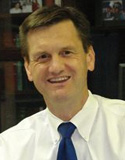
For Republicans old enough to remember President Ronald Reagan’s once-hallowed 11th Commandment – “Thou shalt not speak ill of a fellow Republican” – last week’s knives-out GOP infighting over leadership positions in the state legislature’s 2025-26 session might have seemed like a sin against party unity.
But according to long-time Palmetto State political observers like Beaufort Republican Sen. Tom Davis, it was just the inevitable consequence of now-unchallenged GOP power in South Carolina — and a clear sign of things to come.
“The larger a majority party gets, the more likely it is to splinter,” Davis told the Statehouse Report this week. “Eventually, you start debating amongst yourselves instead of debating with the other side because it’s a foregone conclusion that whatever you promote is going to get passed.”
As a result, Davis says, the larger a majority becomes and the longer it stays in power, the harder it is to stay focused on issues with strong support in every wing of the party.
“Everybody comes to Columbia with different priorities,” Davis said, noting that today’s GOP majority is made up of social conservatives, libertarian conservatives and populist conservatives. “So you start with the issues everyone agrees on, but sooner or later you get to a point where you’ve exhausted those and then it’s a question of which faction will hold sway with the remaining issues.”
And that broader intra-party fight, most political watchers say, is what South Carolinians saw begin to play out last week in the General Assembly — particularly in the House, where Speaker Murrell Smith, R-Sumter, had to fend off a leadership challenge from members of the comparatively small, but populist, hard-right S.C. Freedom Caucus.
The hard-right perspective
Controversial since its founding in 2022, the 17-member S.C. House Freedom Caucus quickly rose to prominence in Palmetto State politics by publicly accusing GOP leaders of selling out conservative principles in service of what it calls a moderate, “Uniparty” agenda.
Tensions arising from those charges broke out repeatedly on the House floor in the 2023-24 session, with one GOP member going so far as donning a tinfoil hat to mock the group’s support for making gold and silver legal tender in the state.

“I want you to support this amendment because I want you to stop thinking, too,” S.C. Rep. Micah Caskey, R-Lexington, said sarcastically from the rostrum, hat on head. “This allows us to trade genie lamps in for our parking tickets.”
But according to the new chair of Freedom Caucus, S.C. Rep. Jordan Pace of Berkeley county, its members are simply holding Republicans accountable for their promises.
“We just want people to vote the way they campaign,” Pace said in a Dec. 9 interview. “When somebody campaigns as a solid conservative and they don’t vote that way, well, that’s what we have a problem with.”
Moreover, he argues, the group’s agenda of deep tax and spending cuts, closed party primaries and further action on social issues like a no-exceptions ban on abortion are precisely what voters gave Republicans a supermajority to do.

That’s why caucus members challenged Smith last week, he says, and why they plan to keep fighting for what they see as governmental and political reform throughout the next session.
“Whoever is in power determines policies,” Pace said. “And in recent memory, people in leadership positions have been more willing to broker deals with the Democrats and the moderate wing of the Republican caucus than they are with the conservatives.”
Institutionalists vs. idealogues
Republican insiders tell Statehouse Report that this escalating fight between idealogues like Pace and institutionalists such as Smith will determine the shape of major legislation as the session gets underway in January.
And according to some, the greatest political strength of the caucus — its unwillingness to compromise on what members say are core principles — is also its greatest weakness when it comes to getting things done.
“They wouldn’t like to hear this, but they would be more effective if they looked for common ground,” said longtime Republican consultant Chip Felkel. “One of the things they don’t understand is that compromise is not a four-letter word.”
At least to date, Felkel says, that attitude has been the source of much of their own frustration.
“They see themselves as enlightened warriors for truth and justice,” Felkel said. “But they tend to waste time fighting about bills that have no chance of passing and then attacking leadership because they didn’t get their way.”
Growing right wing of the Senate

On the Senate side, Davis sees much the same battle shaping up, with a growing hard-right contingent agitating for institutional changes to make the body more responsive to the wishes of GOP primary voters.
“There’s a tension between those who want the Senate to act with more dispatch, and those of us who see the Senate as the chamber that deliberates and has checks and balances that allow everyone to be heard,” Davis said.
For instance, in the last session, a minority of GOP members was able to successfully hold the floor and argue for a six-week ban on abortion, rather than the complete ban favored by many. But with more populist senators in the chamber next year, Davis says it will be harder to slow down debate and fully discuss the policy implications.
Resolving that tension, he added, will likely be the main challenge GOP leaders face in the new year.
“I think that’s what’s going to make 2025 very interesting from a political perspective,” Davis said.
- Have a comment? Send to: feedback@statehousereport.com.


